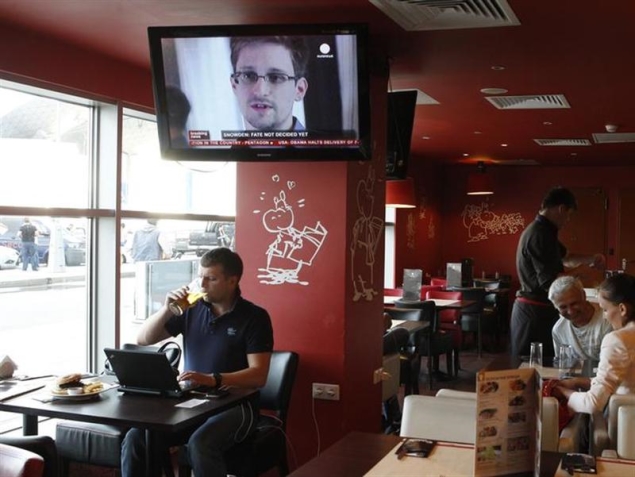- Home
- Internet
- Internet News
- Guardian says Britain forced it to destroy Snowden material
Guardian says Britain forced it to destroy Snowden material

In a column on Tuesday, Alan Rusbridger said he had received a call from a government official a month ago who told him: "You've had your fun. Now we want the stuff back." The paper had been threatened with legal action if it did not comply.
Later, two "security experts" from the secretive Government Communications Headquarters (GCHQ) had visited the paper's London offices and watched as computer hard drives containing Snowden material were reduced to mangled bits of metal.
Rusbridger said the "bizarre" episode and the detention at London's Heathrow airport on Sunday of the partner of Guardian journalist Glenn Greenwald showed press freedom was under threat in Britain.
The nine-hour detention under an anti-terrorism law of David Miranda, Greenwald's Brazilian partner, has caused a furore with Brazil, British opposition politicians, human rights lawyers and press freedom watchdogs among those denouncing it.
Greenwald was the first journalist to publish U.S. and British intelligence secrets leaked by Snowden, the former U.S. National Security Agency (NSA) contractor who is wanted in the United States and has found temporary asylum in Russia.
Under mounting pressure to explain itself, Britain's Home Office, or interior ministry, defended Miranda's detention.
"If the police believe that an individual is in possession of highly sensitive stolen information that would help terrorism, then they should act and the law provides them with a framework to do that," it said in a statement.
London's Metropolitan Police said Miranda's detention had been "legally and procedurally sound".
Miranda, who was in transit on his way from Berlin to Rio de Janeiro where he lives with Greenwald, was questioned for nine hours before being released without charge minus his laptop, mobile phone and memory sticks.
He had been ferrying materials obtained from Snowden between Greenwald and Laura Poitras, an independent film-maker based in Berlin who has also published reports based on Snowden material.
"Public interest"
This law shouldn't be given to police officers. They use it to get access to documents or people that they cannot get the legal way through courts or judges. It's a total abuse of power," Miranda told the Guardian after returning home.
The White House said on Monday Washington was given a "heads up" ahead of Miranda's detention but had not requested it.
Britain's opposition Labour party said on Tuesday that meant senior British ministers must have been involved.
Government ministers "need to explain who authorised the use of terrorism legislation in this case and what the justification was," said lawmaker Yvette Cooper, the Labour spokeswoman on interior affairs.
Staff at the prime minister's office said they would not comment on the Guardian allegations because it was an "operational matter". GCHQ also declined to comment.
Dunja Mijatovic, media freedoms chief at the Organisation for Security and Cooperation in Europe, a 57-nation human rights and security watchdog, said she had written to the British authorities to express concerns about Miranda's detention.
"The detention can be interpreted as putting pressure on Glenn Greenwald after his recent reporting on security issues in the Guardian ... the whole situation sends a worrying message to any member of the media transiting through the UK," she wrote.
Britain also came under attack from press freedom group Index on Censorship, which denounced the forced destruction of computers revealed by Rusbridger in his Tuesday column.
"Using the threat of legal action to force a newspaper into destroying material is a direct attack on press freedom in the UK," the group's Chief Executive Kirsty Hughes said.
"It is clear that the Snowden and NSA story is strongly in the public interest ... It seems that the UK government is using, and quite literally misusing, laws to intimidate journalists and silence its critics."
Rusbridger said the destruction of the computer material would not stop the Guardian from pursuing Snowden stories.
"It felt like a particularly pointless piece of symbolism that understood nothing about the digital age," the Guardian editor said.
"We will continue to do patient, painstaking reporting on the Snowden documents. We just won't do it in London. The seizure of Miranda's laptop, phones, hard drives and camera will similarly have no effect on Greenwald's work."
© Thomson Reuters 2013
For the latest tech news and reviews, follow Gadgets 360 on X, Facebook, WhatsApp, Threads and Google News. For the latest videos on gadgets and tech, subscribe to our YouTube channel. If you want to know everything about top influencers, follow our in-house Who'sThat360 on Instagram and YouTube.
- Samsung Galaxy Unpacked 2025
- ChatGPT
- Redmi Note 14 Pro+
- iPhone 16
- Apple Vision Pro
- Oneplus 12
- OnePlus Nord CE 3 Lite 5G
- iPhone 13
- Xiaomi 14 Pro
- Oppo Find N3
- Tecno Spark Go (2023)
- Realme V30
- Best Phones Under 25000
- Samsung Galaxy S24 Series
- Cryptocurrency
- iQoo 12
- Samsung Galaxy S24 Ultra
- Giottus
- Samsung Galaxy Z Flip 5
- Apple 'Scary Fast'
- Housefull 5
- GoPro Hero 12 Black Review
- Invincible Season 2
- JioGlass
- HD Ready TV
- Laptop Under 50000
- Smartwatch Under 10000
- Latest Mobile Phones
- Compare Phones
- Oppo Find N5
- Apple iPhone 16e
- Samsung Galaxy A06 5G
- Realme P3 Pro 5G
- Realme P3x 5G
- Vivo V50
- Realme GT 7 Pro Racing Edition
- Samsung Galaxy F06 5G
- Asus Chromebook CR11
- Lenovo Yoga Slim 9i (2025)
- Asus ROG Flow Z13 (2025)
- Xiaomi Pad 7
- Huawei Huawei Band 10
- Lava Prowatch X
- Haier M95E
- Sony 65 Inches Ultra HD (4K) LED Smart TV (KD-65X74L)
- Sony PlayStation 5 Pro
- Sony PlayStation 5 Slim Digital Edition
- Blue Star 1.5 Ton 3 Star Inverter Split AC (IC318DNUHC)
- Blue Star 1.5 Ton 3 Star Inverter Split AC (IA318VKU)












